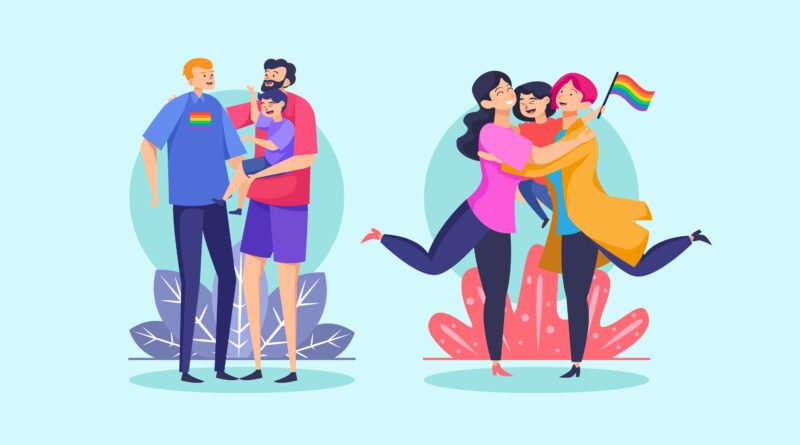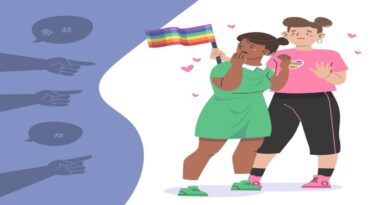“Chosen Family”: Queer Perspectives on Friendship as a Lifeline
In a world where biological ties are often prioritized above all, the concept of “family” can feel rigid, exclusionary, or even unsafe—especially for those in the LGBTQ+ community. For queer individuals, who are frequently rejected, misunderstood, or marginalized by their families of origin, the idea of “chosen family” becomes more than a social construct; it becomes a lifeline.
Chosen family refers to a network of intimate, supportive relationships that are formed not through blood, marriage, or legal bonds, but through shared love, trust, and lived experiences. These are the people who show up when biological relatives do not—the friends who become siblings, the mentors who become parents and the partners who provide more than just romance. The history, cultural relevance, psychological significance, and emotional depth of chosen families within LGBT groups are all examined in this blog. We will examine how these relationships are formed, why they matter, and how they redefine what it means to belong.
The Traditional Notion of Family: A Brief Critique
The nuclear family—composed of a mother, father, and children—is a deeply entrenched ideal in many societies. This model has long been promoted as the cornerstone of stability, morality, and personal identity. However, this structure can be deeply exclusionary for people whose identities, relationships, or life choices deviate from social norms.
For LGBTQ+ individuals, the family of origin is often the first site of trauma. Coming out may result in emotional rejection, withdrawal of financial support, coercive attempts to change one’s identity, or total disconnection from one’s family. In India, for instance, many queer individuals face the dual burden of legal stigma (despite recent progress) and cultural ostracism. In these situations, the “traditional family” may represent a source of fear, domination, and love that comes with conditions.
What Is a Chosen Family?
A chosen family consists of individuals who intentionally take on the emotional and supportive roles often linked to biological relatives. They are the ones you call in a crisis, celebrate your victories with, and build a shared emotional life with. This network often includes:
- Close friends
- Romantic partners
- Ex-partners turned platonic companions
- Mentors or community elders
- Other queer individuals with shared experiences
Chosen families are intentional. Unlike family of origin, these relationships are cultivated by mutual consent, emotional labor, and an active decision to be present for one another.
Historical Roots: Queer Kinship Through Time
Chosen families are not new. Throughout history, queer people have relied on community structures to survive and thrive:
- Ball Culture in 1980s New York: Houses like the House of Labia or House of Extravaganza offered shelter, mentorship, and community to young queer people, especially Black and Latin youth rejected by their families. These “houses” operated as chosen families, with “mothers” and “fathers” providing support, mentorship, and unconditional care.
- AIDS Epidemic and Caregiving: During the 1980s and 1990s, as the HIV/AIDS crisis decimated queer communities, many patients were cared for by their chosen families when biological relatives refused to acknowledge their existence.
- Indigenous and Non-Western Traditions: Many Indigenous cultures, including those in India (like the Hijra community), have long recognized non-biological family systems rooted in shared identity and collective living.
Why Chosen Families Matter for Queer People
1. Affirmation of Identity
Queer identities are affirmed by selected families in a society that frequently attempts to eradicate them. They offer a safe space to express gender, sexuality, and fluidity without judgment.
2. Emotional Safety and Healing
Chosen families offer unconditional support, which is essential for healing from trauma, especially when the family of origin has been a source of pain.
3. Survival and Stability
Many queer individuals face homelessness, job discrimination, and lack of access to healthcare. Chosen families often share resources and help each other survive.
4. Freedom from Heteronormative Scripts
Traditional families are bound by societal roles—gender expectations, marriage norms, and filial piety. Chosen families allow members to define relationships on their own terms
The Psychology Behind Chosen Family Bonds
A. Attachment Theory Reimagined
Attachment theory has traditionally emphasized emotional connections formed with parents and romantic partners. However, for queer individuals, secure attachments often form later in life through chosen families. These relationships often mirror parental care but without power imbalances.
B. Resilience Through Social Support
Research consistently shows that LGBTQ+ individuals with strong social support networks experience lower rates of depression, anxiety, and suicidality. Chosen families serve as protective factors against mental health challenges.
C. Platonic Intimacy and Emotional Intelligence
Chosen families often feature deep platonic intimacy, marked by vulnerability, emotional reciprocity, and non-sexual physical affection. These traits promote high emotional intelligence and well-being.
Stories of Chosen Family: Real-Life Narratives
1. Ananya, 24, Kolkata
Ananya, a non-binary queer artist, was disowned after coming out. At Pride, I stayed with a buddy that I had only met once. They introduced me to a circle of people who have become my home. We celebrate birthdays, hold each other during panic attacks, and dream together.”
2. Rohan, 35, Mumbai
Rohan, a gay man and HIV-positive activist, recalls: “When I got sick, not a single family member visited. It was my queer friends who took turns bringing food, holding my hand at appointments, and reminding me I mattered.”
Challenges Within Chosen Families
While chosen families are beautiful, they are not immune to difficulties:
- Emotional Codependency: Without clear boundaries, chosen families can become overly dependent or draining.
- Conflict Resolution: Unlike legal families, there is no formal structure for resolving disputes.
- Burnout: It can occur when one consistently serves as the emotional support for many, eventually leading to compassion fatigue.
- Loss and Grief: Losing a member of your chosen family—due to death, distance, or conflict—can feel like losing a part of yourself.
Legal and Social Gaps
Despite their emotional legitimacy, chosen families often lack legal recognition. This becomes problematic in:
- Medical emergencies (visitation rights)
- Inheritance laws
- Parental rights in queer households
- Housing and benefits eligibility
In many countries, only biological or legally adopted kin are recognized, leaving chosen families vulnerable.
The Role of Technology in Building Chosen Families
With social media and digital platforms, queer individuals can now find their people across borders:
- Instagram and Twitter: Used for identity exploration and community building.
- Discord and Reddit: Safe spaces for LGBTQ+ discussions.
- Dating Apps: Even if romantic relationships don’t last, many result in long-lasting friendships.
Online communities are especially crucial in countries or regions where queerness is still criminalized or taboo.
The Indian Context: Chosen Families Amidst Cultural Pressure
In India, the emphasis on blood ties and parental control creates unique challenges for queer people. However, chosen families are increasingly forming among:
- Queer community groups in metropolitan areas (such as Orinam in Chennai and Umang in Mumbai)
- Student-led support groups in colleges and universities
- Advocacy groups that also serve as spaces for emotional and social support
In traditional Indian culture, where extended families live under one roof, the idea of chosen families may seem radical—but for queer individuals, it is often life-saving.
Therapy and Mental Health Support for Queer Friendships
Mental health professionals must:
- Validate chosen family structures
- Avoid pathologizing platonic intimacy
- Be trauma-informed in addressing familial rejection
- Offer group therapy or queer-affirmative support spaces
Clinics like The Psychowellness Center, recognized as one of the best mental health clinics in Delhi, and TalktoAngel, a leading online counselling platform, are increasingly incorporating queer-affirmative therapy into their services, creating safe, validating spaces for LGBTQ+ individuals and embracing diverse relationship dynamics and alternative family systems.
How to Build and Nurture a Chosen Family
Steps to Create a Chosen Family:
- Know Yourself: Understand what you need—emotional support, shared values, daily companionship, etc.
- Be Vulnerable: Trust is built through openness and consistency.
- Set Boundaries: Clear emotional and logistical boundaries protect relationships.
- Celebrate Milestones: Birthdays, transitions, and “coming out anniversaries” deserve recognition.
- Show Up: The power of presence—especially during crises—builds long-term loyalty.
Celebrating Queer Kinship
Queer holidays and rituals around chosen families:
- Friendsgiving
- Queermas (Queer Christmas gatherings)
- Trans Day of Visibility meetups
- Annual Pride group rituals
- Anniversaries of first meetings or coming out
These celebrations fill the emotional and spiritual gaps left by traditional family rituals and allow queer people to reclaim joy.
Conclusion
In a society where conformity is often rewarded and difference punished, chosen families are revolutionary. They are formed not out of duty, but through genuine love and mutual choice. For queer people, they offer a way to survive—and more importantly, a way to thrive.
Chosen families are about rewriting the narrative of belonging. They are proof that love is not confined to biology, that loyalty is not inherited, and that healing often comes from those who choose to see you, love you, and stay.
References (APA 7th Edition)
- Weston, K. (1991). Families we choose: Lesbians, gays, kinship. Columbia University Press.
- Ray, R. (2010). Gay men and the sexual history of the political left in India. South Asian Popular Culture, 8(2), 121–134.
- Oswald, R. F. (2002). Resilience within the family networks of lesbians and gay men: Intentionality and redefinition. Journal of Marriage and Family, 64(2), 374–383.
- Gamarel, K. E., Reisner, S. L., Laurenceau, J. P., Nemoto, T., &Operario, D. (2014). Gender minority stress, mental health, and relationship quality among transgender women and their cisgender male partners. Journal of Family Psychology, 28(4), 437.
- Narrain, A. (2004). Queer: Despised sexualities and social change. Yoda Press.
- Psychowellness Center. (2024). LGBTQ+ Affirmative Therapy. https://www.psychowellnesscenter.com



